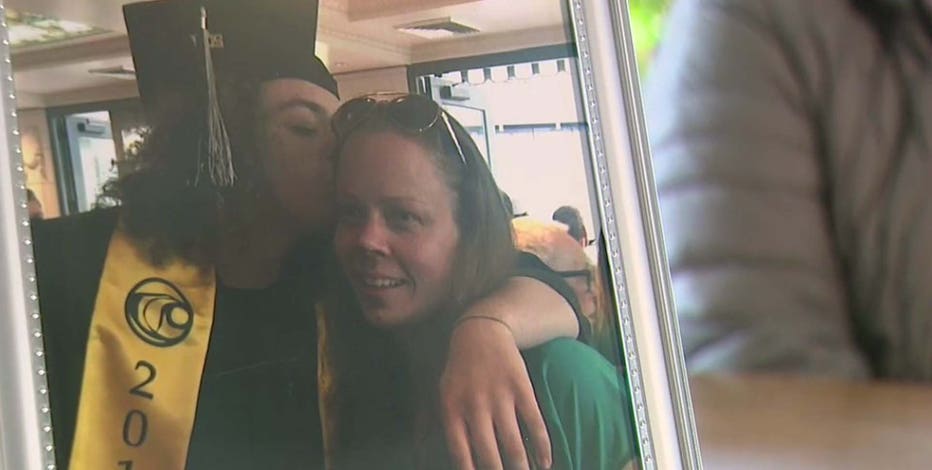Fentanyl treatment for teens faces parental obstacles, lack of locations
SEATTLE - Drug treatment for teens is becoming hard to find, especially in light of the surge of fentanyl overdoses. Confounding the problem is the reluctance of teens to get their parents’ permission into drug treatment.
Jason Cockburn became acutely aware of this issue recently, when he tried to help two teenage boys get into treatment.
"He was disoriented, staggered, falling down, trying to pick stuff up that wasn't there," Cockburn described of his encounter a 15-year-old who was high on fentanyl.
The teen had shown up at Second Chance Foundation, a drug recovery center co-founded by Cockburn in Everett.
"We took him onto the couch and sat him down, and he started overdosing; we gave him Narcan twice," recalled Cockburn.
After another teen showed up, saying he was addicted to fentanyl but couldn’t get into treatment—that’s when Cockburn started noticing a pattern.
"I started reaching out to detox services for him, then it was, 'Oh no, you need the parents’ permission, or we don't have these services available, and we don't take youth at all,'" Cockburn said. "It’s not easy to get teens into treatment, and the treatment centers that do take teens are few and far between."
Second Chance is a day-use recovery center, and not a medical facility that offers drug treatment.
In 2019, the rate of adolescent overdoses nationwide was 2.36 per 100,000, according the Journal of the American Medical Association. In 2020, that rate jumped to 4.57 per 100,000.
In the first six months of 2021, the most recent numbers available show the rate increased to 5.49 per 100,000.
RELATED: Fentanyl overdoses become No. 1 cause of death among US adults, ages 18-45: 'A national emergency'
A primary driver is the increased use of fentanyl, a drug that depending on the dosage, can by 100 times more powerful than heroin and can cause instant death.
"I would be, like, crying on my way to the dope dealer, 'I don't want to do this, I don't want to do this,' and I find myself still doing it," said Justin Low.
The 26-year-old is in recovery at Second Chance. He began his life on drugs at 14 years old, escalated to heroin, and then to fentanyl.
"It just takes over your mind, and even though you can have the best intentions on quitting, it just takes a grip of you, especially fentanyl," said Low.
He can understand how teen drug users wouldn’t want a parent's permission to get into treatment. He entered treatment with the knowledge of his parents, who are also in recovery.
"If I had to go to my parents every time to go off and get into treatment it would be very hard, because I want to make my parents happy," said Low.
Across the street from Second Chance is Cocoon House. For 30 years, the organization has been dealing troubled youth, especially those who are homeless and abuse drugs.
"What [we've seen] is a real increase in the number of opioid addicted youth on fentanyl, it’s kind of a daily occurrence," said CEO Joe Alonzo.
The age of medical consent in Washington State is 13, which means 13- to 17- year-olds don’t need the consent of a parent to seek medical treatment.
But Cockburn and Alonzo say parental consent is still needed with some drug treatment providers.
Featured
'My son is now a statistic'; Tacoma mother warns of fentanyl as fatal overdoses soar
Drug-related overdose deaths in Washington topped 2,000 in 2021, representing a 66% increase compared to 2019, according to the Department of Health.
Get breaking news alerts in the FREE FOX 13 Seattle app. Download for Apple iOS or Android. And sign up for BREAKING NEWS emails delivered straight to your inbox.
"A lot of times that youth is at odds with that parent, or they are on the run from that guardian," said Alonzo. "It becomes a real struggle of the youth making a decision, ‘Do I let my guardian know where I’m at, and am I willing to give up an opportunity to be treated in order to get that?’"
Low said the fentanyl surge in Snohomish County began just as the people started to stay home because of the pandemic.
"It just kind of happened overnight, you just woke up and nobody had what we used to do, it was all just the little blue pill," he said. "I started hearing about people dying for the first time in my life and I got fear, cause really big strong guys I know would just drop like flies, fall over dead."


